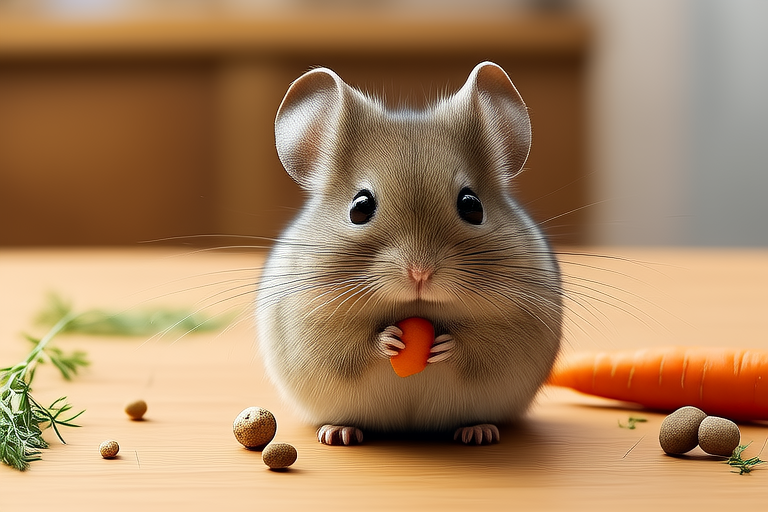Adorable Chinchilla Care Tips for First-Time Owners
Welcome to the wonderful world of chinchilla ownership! These adorable, fluffy creatures are becoming increasingly popular as pets due to their unique appearance and gentle nature. If you’re a first-time owner, this guide will provide you with essential care tips to ensure your chinchilla lives a happy and healthy life.
Creating a Safe Environment
First and foremost, it’s crucial to create a safe environment for your chinchilla. Housing is one of the most important aspects of chinchilla care. Chinchillas require a large cage with multiple levels and enough space to run around. The cage should be at least three feet wide, two feet deep, and four feet high. Opt for a wire cage with solid flooring or a mesh bottom covered with a solid surface to prevent injury from sharp edges. Place the cage in a quiet area away from direct sunlight, drafts, and extreme temperatures.
Temperature control is paramount for chinchillas. They thrive in cool environments, ideally between 60-70°F (15-21°C). Avoid placing the cage near windows or heating sources, as chinchillas can overheat easily. Equip the cage with soft bedding like shredded paper or recycled paper products. Avoid pine and cedar shavings, as they can irritate a chinchilla’s respiratory system. Provide plenty of toys, such as chew sticks, tunnels, and hanging baskets, to keep your pet entertained and mentally stimulated.
Appropriate Feeding Habits
Diet is another critical aspect of chinchilla care. A well-balanced diet ensures your chinchilla stays healthy and active. The cornerstone of their diet is hay, which should be freely available at all times. Timothy hay is preferred for its nutritional benefits. Supplement their diet with pellets specifically formulated for chinchillas. Limit treats to a few raisins or dried rose hips per week, as too many treats can lead to obesity or digestive issues.
Chinchillas also need access to fresh water daily. A water bottle with a sipper tube is ideal, ensuring clean water is always available. Check the bottle regularly to ensure it’s functioning correctly. Providing a balanced diet and fresh water is key to maintaining your chinchilla’s overall health.
Maintaining Hygiene
Grooming is essential for keeping your chinchilla looking and feeling their best. Unlike other animals, chinchillas cannot bathe in water. Instead, they take dust baths, which help remove dirt and excess oils from their fur. Set aside a small container filled with chinchilla dust bath powder and allow your pet to roll around for about 10-15 minutes, once or twice a week. Always supervise them during bath time to prevent accidental ingestion of dust.
In addition to dust baths, regular brushing can help maintain your chinchilla’s coat. Use a soft brush to gently remove any loose fur. This is especially important during shedding seasons. Keep the living area clean by removing soiled bedding and waste daily. A clean environment promotes good health and reduces the risk of infections.
Common Health Considerations
Like any pet, chinchillas can experience health issues. One of the most common problems is dental issues. Chinchillas’ teeth grow continuously, and without proper chewing, they can develop overgrown teeth, leading to pain and difficulty eating. Provide plenty of chew toys and hay to help wear down their teeth naturally. Regular veterinary check-ups are necessary to monitor dental health.
Respiratory infections are another concern, often caused by poor ventilation or dusty environments. Signs include sneezing, discharge from the nose or eyes, and labored breathing. If you notice these symptoms, consult a veterinarian immediately. Additionally, chinchillas are prone to heatstroke, so monitor the temperature of their living area closely and provide ample shade and ventilation during warmer months.
Interactive Activities to Bond With Your Chinchilla
Spending quality time with your chinchilla is essential for building a strong bond. Chinchillas are social animals that enjoy interaction with their human companions. Spend time handling your pet gently, allowing them to get used to being held. Start by offering treats while they’re in their cage, gradually moving to supervised out-of-cage play sessions.
Interactive toys, such as tunnels and ladders, encourage exploration and mental stimulation. Supervised playtime outside the cage allows your chinchilla to stretch their legs and explore new surroundings. Always ensure the area is safe and free from hazards, like electrical cords or toxic plants. Positive reinforcement training can also strengthen your relationship with your chinchilla. Reward good behavior with treats and praise, making interactions enjoyable for both of you.
Fun Facts About Chinchillas
Chinchillas are fascinating creatures with unique characteristics. Did you know that their fur is incredibly dense? In fact, they have more hairs per square inch than any other mammal. This dense fur helps protect them from predators in the wild. Another interesting fact is that chinchillas can jump up to six feet in height, thanks to their powerful hind legs. Their agility makes them excellent climbers and jumpers.
Chinchillas are also known for their expressive faces and vocalizations. They communicate through various sounds, including chirps, squeaks, and purrs. Pay attention to these sounds, as they can indicate different moods or needs. Understanding your chinchilla’s body language and vocal cues can enhance your ability to care for them effectively.
Lastly, chinchillas are nocturnal animals, meaning they are most active during the night. While they may sleep during the day, they can still be playful and alert during early morning or late evening hours. Respect their natural sleep patterns and avoid disturbing them when they’re resting.
Conclusion
Owning a chinchilla is a rewarding experience, but it comes with responsibilities. By providing a safe and stimulating environment, a balanced diet, proper grooming, and regular veterinary care, you can ensure your chinchilla enjoys a long and healthy life. Take the time to learn about their unique behaviors and needs, and you’ll form a strong bond with these delightful creatures. With love and care, your chinchilla will bring joy and companionship to your home for years to come.
